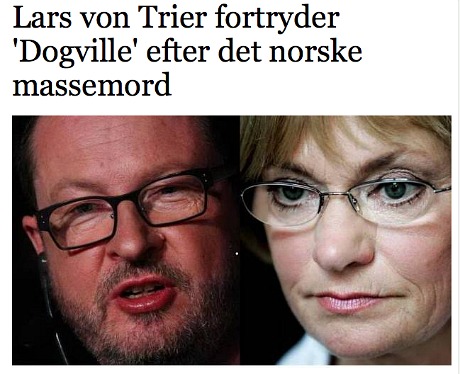Last night Politikien‘s Nils Thoren ran comments from Danish director Lars Von Trier about reports that the now-shuttered Facebook page belonging to Anders Behring Breivik, the 32 year-old rightwing terrorist responsible for the recent Oslo bombing and the 69 murders on the Norweigan island of Utoya, listed Von Trier’s Dogville (’03) as Breivik’s third-favorite film.

(l.) Melancholia and Dogville director Lars von Trier; (r.) Danish People’s Party figurehead Pia Merete Kjaersgaard.
Von Trier is of course no more responsible for Breivik’s carnage than Catcher in the Rye author J.D. Salinger was responsible for Mark David Chapman‘s 1980 killing of John Lennon. And yet Breivik’s stated admiration of Dogville does suggest that Von Trier’s 2003 drama may have influenced him on some level.
Breivik’s Facebook page listed Dogville as his third favorite film right behind Gladiator and 300, and “even von Trier could easily discern the similarities between the carnage at Utoya and the film’s ending,” Thoren writes.
Dogville, one of Von Trier’s best, ends with Nicole Kidman‘s Grace, who’s been exploited and sexually abused by Dogville’s citizenry, ordering the pistols who work for her gangster dad (James Caan) to mow them all down with machine-gun fire.
“I feel badly about thinking that Dogville, which in my eyes is one of my most successful films, should have been a kind of script for him,” Von Trier said. “It’s horrific.
“My intention with Dogville was totally opposite. Namely, to ask whether we can accept a protagonist who takes revenge on the entire village. And here I take the absolute distance from revenge. It’s a way to nuance the protagonist and our feelings and perhaps even uncover it, so it just is not black and white ‘.
And yet Thoren reports that “even Trier believes that Dogville‘s final scene brings very unpleasant memories of Utoya.”
“And you can ask if I regret making the film,” Von Trier is quoted as saying. “And yes, if it was an inspiration, I’m sorry that I made it. But of course I have educational purposes with my films, even if I hesitate to admit it, and my views are the complete opposite of Breivik and his deeds.”
Von Trier said he also believes that all of Denmark needs to look inward after the tragedy in Norway.
“The other day asked a Belgian journalist Von Trier, a Dane, how he feels about the reported fact that Breivik’s manifesto repeatedly emphasizes Denmark as the only decent country because of the Danish policy towards Muslims,” Thoren writes.
“‘It makes me really hurt, but I understand it well,’ Von Trier replied. ‘We might have saved the children and young people on the island [if we had] done much more with Danish People’s Party. For it is the change in attitude which they have provoked, and as we just have let happen, we are paying the price for now.’
“I am no expert in politics, but as I see it, there has for years been a strong Danish tradition of fears of Islam. They have committed atrocious legislative efforts to annoy the minority here and pursue a policy that is well in line with what Breivik preaches. The fhostility to foreigners then spreads to the entire Nordic region and is also present in the minds of Breivik and gives him perhaps the excuse he needs. Therefore I can not see anything other than that we as a nation bears a responsibility for the tragedy in Norway.”
Is there a link between saying what one thinks about immigration and then resorting to violence?
“Of course. And everyone must say what they want. Freedom of speech is the whole cornerstone of our democracy. But it does not exempt [one] from liability. And we have sent the signal that it’s okay to spread hatred against Muslims. Especially after the Danish Peoples Party has been the government’s support party. Because when you lean up against the party and say: Okay, the positions we take in the bargain. So you legitimize them. ”
“I think there is a direct line from Pia Kjaergaard‘s humanity and to Utoya. One must demand that Kjaersgaard steps forward and takes her share of responsibility for what has happened in Norway. For it is a change of attitude, as she and her party have successfully represented
Pia Merete Kjaersgaard “is a co-founder and current leader of the Danish People’s Party, a nativist, national conservative political party in Denmark,” says her Wiki page. “She has become one of the best known politicians in Denmark during recent years, partly for her stance against multiculturalism, unwavering anti-immigration stance and partly for her parliamentary support for the center-right governments of Anders Fogh Rasmussen and Lars Lokke Rasmussen since 2001.”









